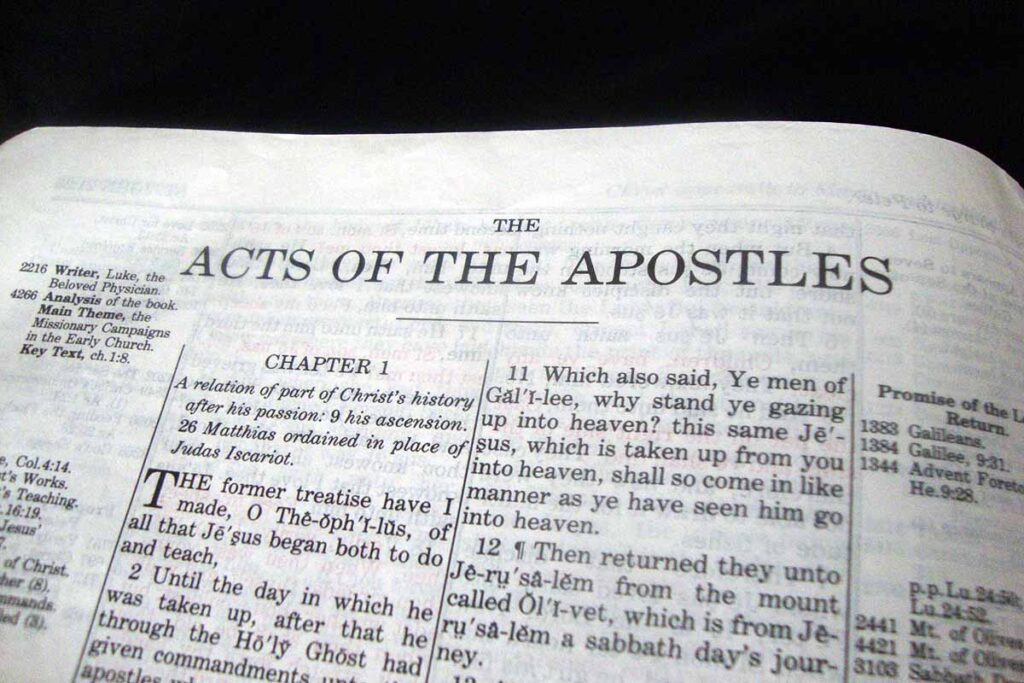The Book of Acts is the historical link between the Gospels and the Epistles. It is the only book that carries on the story from the ascension of Jesus to the period of the Epistles. In one generation the church makes the transition from a primarily Jewish to a predominantly Gentile membership.
After the resurrection of Jesus Christ, Peter preached boldly and performed many miracles. Peter’s actions demonstrate vividly the source and effects of Christian power. Because of the Holy Spirit, God’s people were empowered so they could accomplish their tasks. The Holy Spirit is still available to empower believers today. We should turn to the Holy Spirit to give us the strength, courage, and insight to accomplish our work for God.
Paul’s missionary adventures show us the progress of Christianity. The gospel could not be confined to one corner of the world. This was a faith that offered hope to all humanity. We too should venture forth and share in this heroic task to witness for Christ in all the world.
Writer of Acts of the Apostles
There can be little doubt that the book of Acts and the Gospel of Luke come from the same author. Addressed to the same individual, Theophilus, the similarities between Luke and Acts in literary style, vocabulary, and theological ideas are unmistakable.
Date Written
As early as A. D. 63, after the two years that Paul was in his own hired house in Rome (A. D. 61-63), continuing to preach the kingdom of God (Acts 28:31). Written from Rome, with Paul.
To Whom Written
To Theophilus (God-lover), (Acts 1:1), as a sequel to the Gospel of Luke.
Purpose of Acts
The purpose of the book was to record the continuation and completion of Christ’s earthly ministry through His chosen apostles, according to the mandate in Romans 10:9-15. The apostles’ question in Acts 1:6, regarding the full restoration of the kingdom, was answered in Acts 28:28 with a resounding “No.” While the kingdom had come in part, God would postpone it in order to initiate a dispensation of His dealing with mankind in pure grace. The Acts period was a unique time that is never to be repeated.
During the this period, the purpose of God was to reach all Jews everywhere with the news of Christ (Mark 16:15). Yet, when the gospel (right message) was preached, it had to be done by someone sent (apostello) by God to do so (Romans 10:9-15). It was never done without some physical, visible manifestation to accompany it (Mark 16:17). Paul explained that it was important in demonstrating the power of God (1 Corinthians 2:4-5). Some men of the nations (“Gentiles,” KJV) received the preaching of Jesus Christ once the Jews in their vicinity had refused the same word of truth. The purpose of God in reaching these citizens of the nations was to serve as a means of provoking the Jews to jealousy (Romans 10:19, 11:11, 14). These believers were the wild olive tree (Romans 11:17) grafted into the olive tree (Israel). They were then partakers of Israel’s benefits. The position of these acts period believers among the nations was vastly different from that of believers of any nation after Acts 28:28.
In Acts 13:34, Paul spoke of the “sure mercies of David” (Isaiah 55:3) to describe that which belonged to Christ and to all who would believe in Him during the Acts period. These could lose rewards in the kingdom to come through manifold unfaithful service or even their lives in this world as Ananias and Sapphira did, but they could not lose their salvation once they were identified with Christ.
With Acts Chapter 1 serving as an introduction, the period (the 33 1/2 years following the ascension of Christ) may be divided into four sections. The first three were periods of the sending of the God-commissioned men with the Gospel.
(1) The Great Unity in Jerusalem under the ministry of the 12 apostles (Acts 2:1-7:60).
(2) The Great Scattering of the believers from Jerusalem (Acts 8:1-12:25).
(3) The Ministry of the Apostle Paul to the nations where Jews were living as the result of The Great Scattering (Acts 13:1-21:16).
Paul’s letters written in conjunction with his three missionary journeys were:
(1st) Acts 13 – 14 Galatians (about A. D. 49)
(2nd) Acts 15:36 – 18:22 1 & 2 Thessalonians (about A. D. 50-54)
(3rd) Acts 18:23 – 21:16 1 & 2 Corinthians (about A. D. 54-58
Romans (about A. D. 57-58)
(4) The Arrest, Imprisonment, and Trials of Paul (Acts 21-28)
The great dispensational change was denoted in Acts 28:28. The gospel itself was apostled to all nations. Paul’s remaining commission (jobs) as an apostle were all for the purpose of writing books. After he finished the course laid out for him (2 Timothy 4:7), any further traveling or proclaiming that he did was on the same par with any other person choosing to make known the gospel.
Theological Contribution of Acts
The Acts of the Apostles could be justly entitled, “The Acts of the Holy Spirit,” for the Spirit is mentioned nearly 60 times in the book. In His parting words, Jesus reminds the disciples of the promise of the Father; ten days later the power of the Spirit descends at Pentecost. It is a reversal of the Tower of Babel, where languages became confused and nations were separated by misunderstanding.
Special Consideration in Acts
Nearly one-fifth of Acts consists of speeches, primarily from Peter, Stephen, and Paul. Common to each of the speeches is the earliest basic framework of gospel proclamation.
- The promises of God in the Old Testament are now fulfilled.
- The Messiah has come in Jesus of Nazareth, who did good and mighty works by the power of God, was crucified according to the purpose of God, was raised from the dead, and now reigns by the power of God, and come again to judge and restore all things for the purpose of God.
- All who hear should repent and be baptized.
Recommended Bible Study Resources
ESV Study Bible – Study Bibles give you a deeper understanding of God’s Word with tools for life application like commentary, maps, charts, concordance, and study notes. Search our popular translations- NIV, ESV, NKJV, KJV and more!
Believer’s Bible Commentary: Second Edition – A Bible commentary is a written, systematic series of explanations and interpretations of Scripture. Commentaries often analyze or expound on individual books of the Bible, chapter by chapter and verse by verse. Some commentary works provide analysis of the whole of Scripture.
The New Strong’s Expanded Exhaustive Concordance of the Bible – The best concordance for word study! This exclusive new edition of a legendary classic puts generations of biblical research at your fingertips. A valuable tool for pastors, teachers, and students of the Bible.
Vine’s Complete Expository Dictionary of Old and New Testament Words – This classic word study resource allows you to study the meaning of biblical words in the original languages without spending years learning Greek or Hebrew. A great resource for students, seasoned pastors, and anyone who enjoys biblical word studies–even if they have little to no formal training in Hebrew or Greek.
Halley’s Bible Handbook – The beloved and classic Bible companion has been thoroughly updated, while retaining its time-honored features and Dr. Halley’s highly personal style, to offer even greater clarity, insight, and usefulness.
Click here to view or print the above Bible outline on “Acts of the Apostles“





